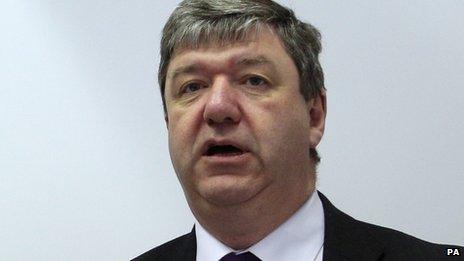Alistair Carmichael's first big constitutional speech
- Published

Alistair Carmichael has rejected the 'bruiser' tag given to him by the media
One hesitates to compare Alistair Carmichael to Michael Palin (in his Monty Python days). I mean, I know the Scottish secretary has disavowed the "bruiser" tag which was applied to him by the wicked media when he entered office.
But still he is quite a big lad and one can never be sure how he will react when his remarks are listed in the same compendium as manic, if hilarious, comic sketches.
I am thinking in particular of the Spanish Inquisition - which, according to Python, nobody expects. You'll recall that Palin and chums had difficulty defining how many chief weapons were available to them in their pursuit of truth.
Similarly, Mr Carmichael seemed a trifle unsure. He said he had three key questions for the Scottish Government about their forthcoming White Paper on independence. Then he cheerfully produced a fourth - and, entirely unabashed, declared that he had many more in reserve.
Still, who's counting? This was Mr Carmichael's first big constitutional speech since he replaced Michael Moore at the Scotland Office.
Patriotic credentials
Firstly, he set out his patriotic credentials (born in Islay, fond of a dram, father a native Gaelic speaker etc). This was not a public CV but rather a rebuttal of those online who had suggested that his comments anent shipbuilding had undermined his Scottishness.
Patriotism, he said, was not confined to those who supported independence. Nor was virtue uniquely a function of the Union. It was a question of pragmatism. Or rather several questions, Palin-style.
These included: what was Plan B if rUK rejected a sterling currency zone; how would Scotland fund pensions without the larger funding pot of the UK; what would be the cost of establishing independence…..and, that fourth question, how would an independent Scotland fill the funding "black hole" in her accounts?
In response, on sterling, the Scottish government says it would be incontestably in the interests of rUK to maintain a stable currency. They tend not to talk about Plan B (too confusing - which is precisely why the secretary of state poses the question).
But the answer, as confirmed to me by Angus Robertson MP, lies in speeches by Scottish ministers to the effect that an independent Scotland could use sterling unilaterally anyway - in effect, presenting rUK with a choice: sign up to a compact or face the fact that Scotland can deploy sterling regardless.
Pension challenge
On pensions, they argue that Scotland presently spends a lower percentage of wealth on welfare than rUK. Thus, they argue, Scotland is better placed than rUK to confront the challenge of pension and other costs.
They tend to answer questions three and four together - noting that there would be some potential cost savings for an independent Scotland, that much of the machinery of government exists and that, where it would be necessary to set up new structures, Scotland would be entitled to claim a proportionate share of UK assets.
Interviewed by BBC Scotland, the Finance Secretary John Swinney said that it would be impossible to generate answers which would satisfy Mr Carmichael - because he was not a dispassionate observer but an advocate of Union.
He has a point. However, Mr Carmichael has also seized upon a potential quandary which confronts Nicola Sturgeon and her colleagues in drafting the White Paper. Which is the inevitable absence of absolute, final certainty.
Uncertain world
Voters tend to like certainty - even though they know that this is an uncertain world. They want precision. If a politician opens by saying "on the one hand…", they tend to growl and mutter. "Answer the question" will be the cry.
As billed on this site previously, such precision is not available to the Scottish government in drafting the White Paper. Indeed, one might say that it is not readily discernible in this troubled planetary dimension.
In the White Paper, there will be elements that are structural: an independent Scotland would have full fiscal control. There are elements that are based upon policy: an independent Scotland might use that control to cut corporation tax or whatever.
Then there are elements that are subject to negotiation. An independent Scotland would use the pound as part of a sterling zone; would be a member of NATO; would retain EU membership but on an autonomous basis.
Each of these, by definition, requires consent from other parties. From rUK/Bank of England; from other NATO countries; from EU member states.
It is the contention of Scottish government ministers that such agreement would readily be forthcoming - on the basis that it would be in the interests of the other parties to accept an independent Scotland, that they would not, like Sam Goldwyn, declare "include me out."
Already, though, one can anticipate the response from Mr Carmichael and colleagues. Having demanded precision, they will declare that the White Paper falls short.
- Published13 November 2013
